UK property experts have reported the biggest rise in house prices since September 2022 in December, as well as a continued rise in sales and inquiries from new buyers, in contrast to more mixed results some other housing market surveys.
The Royal Institution of Chartered Surveyors said on Thursday that its monthly house price balance sheet – which measures the difference between the percentages of surveyors who saw price rises and falls in the previous three months – increased to +28% in December, compared to +24% in November.
This is the highest reading in the survey since September 2022, just ahead of Prime Minister Liz Truss’s “mini-budget”, which saw government borrowing costs and mortgage rates rise, as well as than a sudden drop in housing purchases.
Government bond yields rose again in December and jumped at the start of 2025 – with yields on 30-year bonds hitting their highest level since 1998 – although the impact on mortgage rates and availability has so far been much more limited than in 2022.
Simon Rubinsohn, chief economist at RICS, said the December survey “indicates further improvement in housing market sentiment despite concerns about the potential impact of rising bond yields on borrowing costs “.
The net balance of surveyors predicting a rise in house prices over the next 12 months has increased to +53%.
The balance of short-term expectations for rents increased from +29% to +37%, reflecting a shortage of rental properties due to landlords selling.
The stronger price trend echoes that shown in official data for sales ended in November – where prices rose 3.3%, the highest since February 2023 – and in December data from lender Nationwide which showed an increase of 4.7%, the highest since the end of 2022.
However, December data from rival lender Halifax showed the first monthly fall in prices since March and the Bank of England’s mortgage approvals figures fell to their lowest level since August.
Economists polled by Reuters in November forecast that British house prices would rise by an average of 3.1% in 2025, while rents would rise by 4% to 5%.
Belgium






